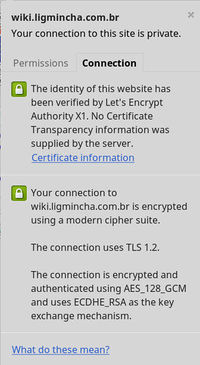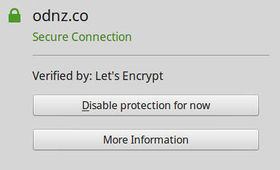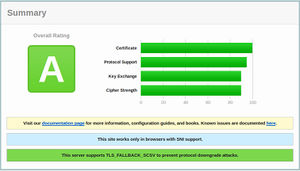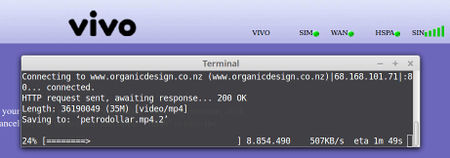Sandbox
Free SSL certs for everyone!!![edit] |
| Posted by Nad on 3 December 2015 at 19:53 |
|---|
This post has the following tags: Server
|
| LetsEncrypt is a new Certificate Authority, it’s free, automated, and open! It went public at 18:00 UTC today, and we had our first certificate made within the hour, and documented the procedure here.
The procedure is far simpler than all the back-and-forth of signing and requests that is required with the "legacy" corporate method, you simply install the LetsEncrypt utility on your server and tell it to make all your sites secure! Simple as that! Although we do have a very complicated configuration so I decided to have it just make the certificates and let me adjust the configuration manually - but even that process was eazy peazy lemon squeezy :-) Here's screenies of Chromium (right), Firefox and SSL labs responses to our fist test domain secured with a LetsEncrypt certificate. |
Oba! our net connection just got WAY better!!![edit] |
| Posted by Nad on 29 November 2015 at 10:52 |
|---|
This post has the following tags: Our third year on the land
|
| Our new big antenna's been awesome, it always gets a usable 3G connection (even though it's only zero or one bar signal) and always gets a four or five bar 2G signal. But regardless of that the actual bandwidth has been getting worse and worse - first just in peak hours, but recently the badness has been creeping forward more and more, until often it's been unusable even at 8am!
But then this morning when I connected I noticed that it was a four bar connection, and we're on 3G!!! I tested the bandwidth to see if it was just some weird glitch and we got a consistent download speed of 2-3 megabits! We've never once had more than a single bar on 3G, and the absolute best bandwidth we've ever had is 1 megabit, and that was very intermittent! All I can think is that a new tower must have finally gone up near by :-) (At least I really hope that's the case, rather than it being some strange short-lived atmospheric condition or something!) Update: By midday the signal had gone up to full strength and our bandwidth was consistently over 3 megabits peaking at over four! |
Copy-to-sent bug finally fixed after two years![edit] |
| Posted by Nad on 24 November 2015 at 15:37 |
|---|
This post has the following tags: Server
|
| A couple of years ago I configured the server to do the process of copying user's sent emails into the "Sent" mail folder on the server-side rather than the client having to do it since that effectively involves sending the whole message to the server twice. Not only does it have to be sent twice, but for some reason the Thunderbird email client tends to lock up during the copying to sent process for some reason. So I created this addition to our email configuration procedure which gets the server to do the job instead.
But there's one complication. The message that's copied doesn't have the Bcc header as it's been stripped by the time the message gets to the stage of being copied. It's very important that the messages in the "Sent" folder have their Bcc header because you want to know who the message was sent to, and you may also want to modify and re-send the message again. So the Exim system-filter that copies the message also calls this copy-to-sent.pl Perl script which finds the message that was just copied to the "Sent" folder and then re-builds its Bcc header by getting all the recipients from the Exim $recipients variable and removing the ones found in the To or Cc headers of the message. The only problem is that it hasn't worked properly ever since it was made two years ago! It's always added the Bcc header even if there wasn't one and put all the recipients in there including those from the To and Cc headers. I finally got around to adding detailed logging into the script so I could track down the problem - which turned out to be nothing more than a "+" symbol needing to be added into the regular expressions that extract the email addresses from the To and Cc headers. |











